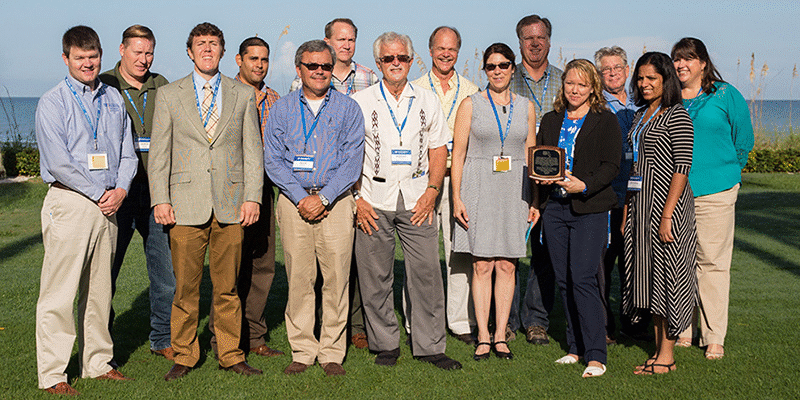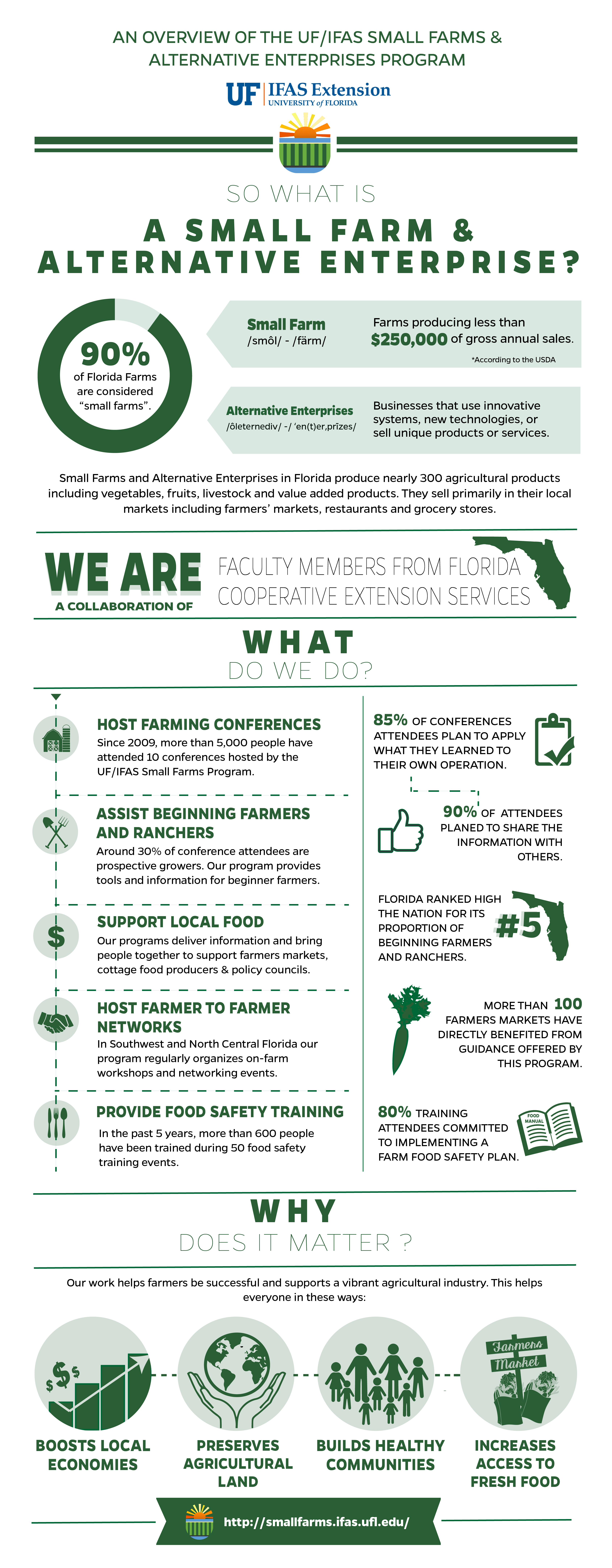About Us
Our Team:
We are State and County Faculty located across the state and connected by the land grant mission to “Extend” University resources and expertise to the citizens of Florida. In addition to work with this team, many members are active in supporting other areas of agriculture from large state issues like citrus greening to local gardeners and home landscapes. Our team is constantly learning from farmers like you, from research, and from regular in-service trainings to update and hone our skills.
Our range of expertise includes:
- Educating decision makers
- Community economic development
- Food systems development
- Technology systems such as hydroponics, irrigation apps, and more.

Who we serve:
UF/IFAS Extension works with farms of all sizes. However, we recognize the unique educational needs that small farm operators have. Small farms and small food businesses are an increasingly important sector in the state of Florida. These farmers and business owners produce food and services for consumers who are looking for fresh, quality food, to support their local economies and reconnect with the land. This sector is as diverse as it gets, from agritourism operations, Community Supported Agriculture (CSA) vegetable and fruit farms, hydroponic operations, beekeeping, and livestock, Florida farmers are proud to share their talents and products with consumers, and we are dedicated to helping them succeed.
Where we come from:
In 2005 UF/IFAS extension faculty at the state and county level received multiple requests from the small farm industry in Florida. As a response, this team developed educational programs to meet the needs of this sector. Since then, the team has created numerous learning and networking opportunities at the county, multi-county, and state levels.
How we Measure Success:
The UF/IFAS Small Farms and Alternative Enterprises team measures program success based on the priorities outlined in a strategic plan, informed through public and internal needs assessments, every five years. The current strategic plan of the Florida Cooperative Extension Service, The Pathway to Creating Engagement Through Innovation and Excellence (The Extension Pathway) describes the goals and initiatives of UF/IFAS and FAMU Extension to meet the current and emerging needs of our state.
Click here to learn more about the Extension Pathway
Our overall all goals are to:
- Cultivate a robust and resilient Florida food system by strengthening food and value-added industries,
- Support the development of a small farm industry that offers a variety of commodities and utilizes innovative production and processing technologies,
- Ensure an abundant, sustainable, nutritious, safe, and affordable food supply for all,
- Assure consumer confidence in the quality, value, and consistency of Florida product, and to
- Facilitate a broader understanding, mutual respect and collaboration of urban, agricultural, and environmental interests.
Metrics for major objectives of the Small Farms and Alternative Enterprises Program:
- At least 65% of beginning farmer and rancher participants will report increased knowledge of strategies to reduce common mistakes in production, management, and marketing.
- 65% of beginning farmer and rancher participants will develop a marketing plan.
- At least 20% of beginning farmer and rancher participants will complete a business plan.
- At least 30% of participants will report an increase the diversity of income-generating commodities and/or products at the farm level.
Because our farmers are diverse, so are our programs. Many programs are crossover efforts that contribute to multiple objectives described in the Extension Pathway. Extension programs are evaluated by participants, and their valuable feedback is used to improve current programs and design new programs when needed.
Click here to learn more about the impacts of Extension Programming
Our efforts also contribute to these metrics:
- Number of new or improved value-added products sold by producers (or other members of the food supply chain)
- Number of new food processing facilities, including inspected kitchens, niche meat processors, and larger animal/fruit/vegetable processors
- Number of participants attending educational programming for small farm operators, processors (big and small), or beginning farmers/ranchers showing knowledge gain on recommended practices
- Number of participants attending educational programming for small farm operators, processors (big and small), or beginning farmers/ranchers that adopt one or more recommended practices
- Number of participants demonstrating improved knowledge of food systems including food labels, production practices, commercial food production and preservation, food waste management, etc.
- Number of producers who developed a farm food safety plan
- Number of growers, producers, food workers completing GAPs, GMPs, HACCP, PSA, PC, food safety certification, or farm food safety educational programs for Exempt and Qualified Exempt operations.

Team Leadership:
- Dr. Danielle Treadwell, ddtreadw@ufl.edu, (352) 273-4775, is an Associate Professor in the UF/IFAS Horticultural Sciences Department, and the Organic Vegetable Extension Specialist. Danielle earned her PhD in Horticultural Sciences from North Carolina State University. Danielle anchors funding and vision for the statewide team and thrives on fostering initiatives to advance opportunities for small farms and alternative enterprises in Florida. Danielle’s picture is on the left.
- Dr. David Campbell, campbell@ufl.edu, (352) 294-1692, is a State Coordinator in the UF/IFAS Horticultural Sciences Department. David earned his PhD in Horticultural Sciences from the University of Florida. David provides strategic planning and logistical support for the statewide team with a focus on project management, on farm research, and application of innovative tools and techniques. David’s picture is on the right.


The Small Farms Team Appreciates the support of Dr. Sebastian Galindo, UF/IFAS Agricultural Education and Communication, Department, Gainesville.
Dr. Galindo assists the team with standardization of Food Systems evaluation tools, and Institutional Review Board (IRB) approved or exempted surveys repeated over many years. This approach allows us to recognize trends and report robust metrics for outcomes of our Small Farms Food Safety Training and Small Farms Conferences.
Extension In The Community
Extension Programs are guided by the input of local Advisory Committees that meet periodically for planning and review. The Committees generally provide support including volunteering to anchor Extension programming in the community. Like to provide your input? Advisory Committee membership is designed to be representative of the audience they serve and include a rotation plan to regularly refresh the committee. Contact your local Extension office for opportunities to serve.
The mission of the Extension Service is to provide research based information to improve the lives of everyday citizens. Many Extension faculty are community board advisors or members to provide feedback and guidance to local community organizations. Contact your local Extension office for more information on Extension’s involvement in your community.
We appreciate your feedback!
Partners:
Our team collaborates extensively with various actors within and outside Florida, including:
- American Farm Bureau
The Voice of Agriculture - Florida Farm Bureau
The Voice of Florida Agriculture - FDACS
Florida Department of Agriculture and Consumer Services - Florida Department of Environmental Protection (DEP)
More Protection, Less Process - Florida FWC
Florida Fish and Wildlife Conservation Commission - USDA
United States Department of Agriculture - Florida Organic Growers and Consumers
Connect With Us
Dr. Danielle Treadwell
ddtreadw@ufl.edu
(352) 273-4775



